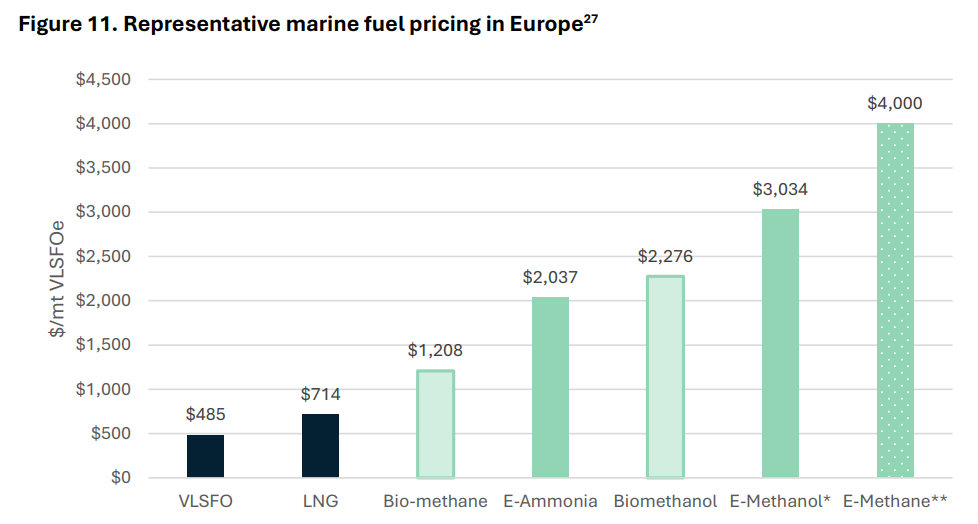The World Shipping Council (WSC) has released a new research that shows both renewable-capable vessels and renewable fuels could be available to meet EU 2030 targets, but that the price gap between fossil and renewable fuels is the major barrier to making decarbonisation a reality.
The first “WSC EU Shipping Decarbonisation Report – Can the EU Fuel Shipping’s Decarbonisation?” – launched at the European Shipping Summit 2025 in Brussels, provides a comprehensive analysis of shipping’s transition to renewable fuels in the EU. The report finds that without effective regulations, the high price of renewable marine fuels will limit and delay production.

Opportunities for the EU to supply future renewable fuels demand
There are clear signs that production is increasing within the EU to supply renewable fuels. Europe currently supplies 20% of the world’s marine fuels and must significantly expand renewable fuel production to maintain this share in a decarbonised shipping sector. However, the current price gap between renewable and conventional fuels, alongside competing demands from other sectors, will impact the shipping industry’s ability to utilise that supply.
Cost barrier will slow uptake and prevent achieving 2030 targets in FuelEU and at IMO
The significant cost disparity between renewable and fossil fuels presents a major obstacle:
- Bio-methane is 169% more expensive than fossil LNG.
- Bio-methanol is 469% more expensive than Very Low Sulphur Fuel Oil (VLSFO).
- E-methane and e-methanol are projected to be 560% and 626% more expensive than their fossil equivalents.
Without targeted regulatory and financial mechanisms to bridge this gap, market uptake of renewable fuels will remain slow, delaying decarbonisation goals.
EU regulation is supporting regional transition
For renewable fuels to be commercially viable, strong regulatory frameworks must incentivise investment and adoption. Ahead of global regulation, the EU has implemented regional policies:
- FuelEU Maritime – setting targets for reducing GHG intensity in marine fuels.
- The Emissions Trading System (EU ETS) – introducing carbon pricing for shipping.
- The Alternative Fuels Infrastructure Regulation (AFIR) – promoting investments in refuelling infrastructure for low-carbon fuels.
These policies are designed to drive investment in cleaner shipping fuels and encourage widespread adoption.
Effective regulations are necessary to achieve 2030 targets and beyond
As global regulations are developed by the International Maritime Organisation (IMO), the EU should align regional policies to prevent market distortions.
EU Member States and IMO delegations recognise that a GHG pricing mechanism is necessary to decarbonise shipping. Effective regulation should bridge the price gap between conventional fossil fuels and renewable alternatives to scale the renewable market and ensure commercial viability.
This report recommends that the EU take regulatory action to:
- Align regional policies with global regulations.
- Apply the Well-to-Wake principle to ensure that renewable fuels are rewarded.
- Develop cost-for-difference mechanisms to catalyse renewable marine fuel uptake.
- Implement fuel certification systems that ensure a global supply of truly renewable marine fuels.
Carriers and fuel providers are clearly committed and investing in vessels and fuel production in anticipation of regulation, putting shipping on track to reach its 2050 decarbonisation goal and 2030 targets. To stay on track and actually reach the net-zero goal, we rely on regulators to show the same commitment in putting in place effective measures that will make it possible for renewable maritime fuels to compete with fossil fuels,
… Joe Kramek added.































































Methanol provides a pathway towards net carbon neutral operations.
It is a liquid at ambient temperatures and pressure
An easy-to-handle, proven solution
Unlike ammonia, hydrogen, ethane, LPG and methane it does not need to be pressurised, compressed or stored cryogenically.
Low emissions compared to existing marine fuels
Burns cleanly compared to conventional fuel oil
Retrofittable
Methanol leads the way offering a viable and proven next step on the path to decarbonisation.